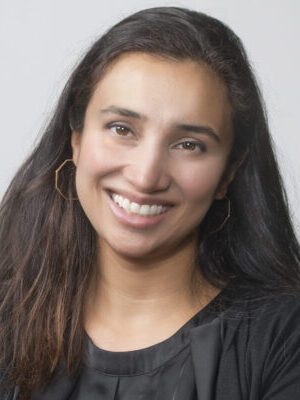In Brief
- Haar works at the intersection of health and human rights, as both a researcher and practitioner.
- The Pozen Center showed her that this kind of work was possible.
- Her research subjects have included the medical effects of torture, crowd-control weapons, ethnic cleansing, conflict, and crowd-control.
- Recently, she helped shape global best practices for interviewing possible victims of torture.
Rohini Haar, AB'21, MD'25, showed up for her first year at UChicago already sure she wanted to become a medical doctor. 26 years later, she has an MD and sees emergency patients in Oakland, California. But that’s just one part of how she puts her medical training to use in the world. She’s also a prominent human rights practitioner, contributing to cutting-edge efforts to document and analyze human rights violations worldwide.
Haar has worked with major human rights organizations like Physicians for Human Rights, researching and writing about issues like the health impacts of crowd-control weapons used globally to curtail the right to assembly and free expression. She’s traveled the world conducting medical investigations that help establish histories of torture and ethnic cleansing campaigns. Most recently, she served as a chapter editor for the 2002 update to the Istanbul Protocol, the international guide to best practices for people investigating and documenting torture and other forms of ill-treatment.
Looking back, Haar locates the key turn in the road – the spot where her trajectory veered from doctor to doctor doing human rights work – at the Pozen Center.
Taking human rights courses in the College Core curriculum, she encountered for the first time the idea that medical professionals could make a unique contribution to human rights practice. She was especially inspired by the work of Pozen Center founding board member Robert Kirschner, an internationally recognized authority on the forensic investigation of human rights violations.
When I was a student at the Pozen Center, I would often think to myself––and I wasn’t the only one––that what I really wanted was to do what Bob [Kirschner] did. To put science and medicine to work for human rights.
The Center quickly became the main hub of Haar’s UChicago community. “It was this really warm, wonderful place on campus,” she recalls. “There was this little lounge with really bad coffee, and I would go hang out there between classes with other students, staff and faculty who were asking similar questions about the world and how to engage in it.”
As an undergrad Haar did a human rights internship in Ethiopia, working with the International Rescue Committee to help address a major drought affecting refugees from Somalia. Later, as a student at the UChicago medical school, she did a second internship, this time traveling to Morocco to work with Amnesty International, helping to write a human-rights curriculum for doctors and nurses in training.
During medical school Haar also worked part-time at the Pozen Center, helping undergraduates find their way to the internships that best meshed with their interests. “Often that meant emailing people from our own internship cohorts, asking what they’d done, connecting them to the new cohort, passing down their connections and experiences so other people could benefit.”
helping to shape human rights practice worldwide
Today, Haar’s home base as at the University of California-Berkeley, where she teaches at the School of Public Health and works with Berkeley’s Human Rights Center, frequently in collaboration with major international human rights organizations
For the 2022 revisions to the Istanbul Protocol, Haar spent years working with other health and human rights experts to update the chapter about best practices for interviewing victims of torture. Since the original Protocol was published, in 1999, many new insights had emerged about the possibility of retraumatizing interviewees; the impact of gender, religion, and race on interviews; and the challenges specific to interviewing children.
“I feel very lucky,” she says. “When I was a student at the Pozen Center, I would often think to myself – and I wasn’t the only one – that what I really wanted was to do what Bob [Kirschner] did to put science and medicine to work for human rights. And now I’ve had the chance to work on these guidelines that will inform human rights work all over the world for years to come.”
Haar will be on campus on April 11 and 12 for a panel and workshops on the updated Istanbul Protocol’s relevance to work with asylum-seekers in the Chicago area. Her April 11 panel talk will follow a keynote address by Vincent Iacopino, the Protocol’s principal organizer. On April 12, she will give a talk and lead a workshop on how to conduct a responsible and effective medical evaluation of an asylum-seeker.
- Read “Lethal in Disguise,” Haar’s report on crowd-control weapons.
- Explore the 2022 edition of the Istanbul Report, including the chapter Haar edited on interviewing torture victims.

